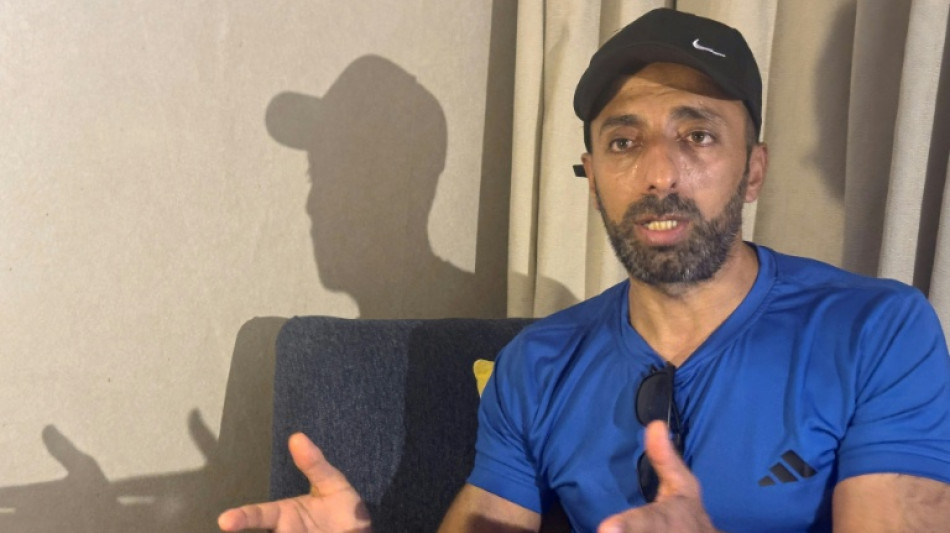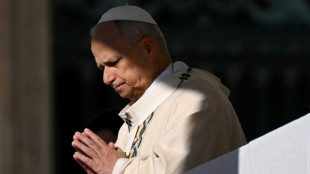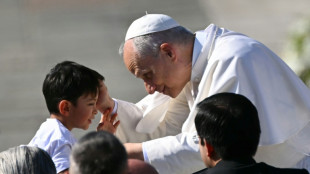

Palestinian prisoners freed in hostage swap go from jail to exile
They were freed in exchange for Israeli hostages held in Gaza, but instead of going home, 154 Palestinian ex-prisoners were exiled to Egypt, where they are confined to a hotel and kept under tight surveillance.
All of them had been sentenced by Israeli military court to life in prison on charges of murder, belonging to Palestinian militant groups banned by Israel, and other acts of violence.
But when a ceasefire took effect in Gaza earlier this month, the group was put on buses and sent to Egypt, where authorities have put them in a five-star hotel that they cannot leave without clearance.
"We were separated from our families for 20 years," Murad Abu al-Rub, a 45-year-old who spent two decades behind bars for murder and for belonging to a Palestinian organisation banned by Israel, told AFP.
Now, he is living in uncertainty and under close surveillance, far from the Palestinian city of Jenin where he was born.
"Nothing has changed. I still can't see mother or my siblings," Abu al-Rub told a team of AFP journalists who were able to access the hotel.
Since the US-brokered ceasefire took hold on October 10, Hamas has freed all 20 surviving Israeli hostages in exchange for nearly 2,000 Palestinian prisoners, most of whom returned to Gaza and the West Bank.
During previous truces in the war sparked by Hamas's October 2023 attack, thousands of other Palestinian prisoners were freed in similar exchanges.
The vast majority of those with life sentences were exiled to Egypt, which has formal ties with Israel and played a key mediation role.
Rights groups have long criticised Israel's use of military courts to try Palestinians suspected of security offenses, saying they do not offer fair trial guarantees.
- Uncertainty -
In Egypt, the 154 men are not free to move, and they have no work permits and no idea what comes next. The government has not issued any formal statement about their status.
"No Arab country wanted to take us in," said Abu al-Rub, who was imprisoned for the killing of four Israeli soldiers in 2006 in an operation by the Al-Aqsa Martyrs' Brigade, a movement linked to the Palestinian Authority.
In the hotel corridors, the men spend hours on the phone, speaking to relatives.
"When I was arrested, my little sister was 15," Abu al-Rub said. "I didn't recognise her when I saw her on a video call."
Over 19 years, he was shuffled through eight different Israeli prisons, never staying more than a few months in each.
- Conditions -
Kamil Abu Hanish, who spent 22 years in Israeli prisons, was jailed for murder and for belonging to the Popular Front for the Liberation of Palestine (PFLP), according to Israel's justice ministry records.
He described the relief of being freed from jail.
"It was like moving between two worlds... from a world of shackles and locked doors to a world of freedom and open space," he said.
But he also described his final hours in custody as some of the harshest.
"Dozens of prisoners were tied together with ropes. They blindfolded us and forced us to kneel. Then they made us lie face down with our hands bound," said Abu Hanish.
Before Hamas's October 7 attack, prisoners could study, play sports and attend daily discussion groups, he said, with inmates recounting a tradition of protest and rebellion in order to obtain these rights.
"We played volleyball and table tennis and held three educational sessions a day," Abu al-Rub said.
"We had no rights left -- even the simplest," he said, adding that pens, paper, films, TV and newspapers were banned after October 7.
"Everything we had, including clothing and blankets, was confiscated. We were left sleeping on iron beds" during winter.
Palestinian, Israeli and international rights groups have documented similar claims of mistreatment, but Israel denies any such violations and says its prison service operates in accordance with the law.
According to the Palestinian Authority, nearly 11,000 Palestinians remain in Israeli custody, on charges related to the Israeli-Palestinian conflict.
- Resettlement? -
Mahmoud al-Ardah, 50, also jailed on murder and other security charges, said the last two years were the worst.
"Daily beatings and humiliation," said the man, accused of belonging to the Islamic Jihad organisation. "In the last two years, I suffered more than in the previous 30."
In 2021, Ardah was one of six inmates who escaped Israel's Gilboa prison by digging a tunnel with spoons and improvised tools. He was rearrested and put in solitary confinement.
Egypt first received 150 exiled prisoners in January, and more than eight months later, most of them are still in the same hotel, their fate undecided.
Hasan Abd Rabbo, of the Palestinian Prisoners' Club, told AFP that the men remain in Egypt with accommodation costs covered by Qatar, while talks are underway over resettlement.
He said possible destinations include Qatar, Turkey, Pakistan and Malaysia.
D.Richter--MP




